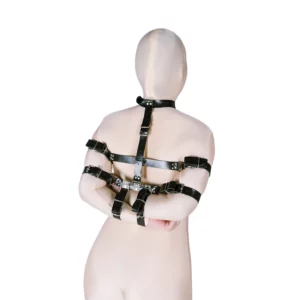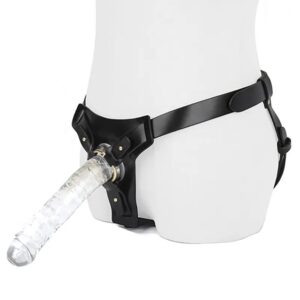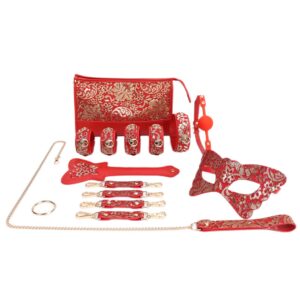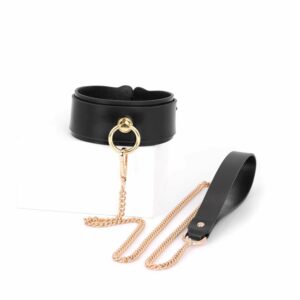In the BDSM scene, there are certain behaviors, known as “Red Flags,” that suggest manipulative or selfish intentions, ignorance, or lack of knowledge. Recognizing these red flags is crucial for your safety. This article focuses on the “Dangerous Dominants” and provides a list of ten warning signs, particularly relevant in the initial stages of getting to know someone or at the beginning of a relationship.
1. Dom doesn't respect a safe word and doesn't want one
If a Dom doesn’t allow you a safeword because they claim they don’t need one, that’s a significant red flag. Your safeword is your safety line. It gives you the chance to stop, slow down, or change something. Someone who doesn’t give you these options and thereby takes away your control is not respecting your boundaries.
2. Refuses to discuss the general conditions
Another red flag is when a dominant does not talk about the general conditions and soft and hard limits. If a Dom admits to no limits, claims they don’t need them, or even goes so far as to reject the concept of limits, that’s a red flag. Such Doms are not focused enough on you personally. Clearly explain your boundaries beforehand. If your top doesn’t even want to hear it, don’t get involved.
3. No Before and Aftercare? Red Flag Alert!
It is important to check your current physical and mental situation before each session in order to become aware of the other person. This shows that the person you are talking to is interested in you and is incorporating your condition into your session. A dominant who doesn’t respect your concerns and feelings, but even makes you feel like you should be ashamed of them, is ignorant. Such behavior is a red flag.
If the Dom even reacts with phrases like “Don’t act like that” when you describe your emotional or physical situation, you should cancel immediately. “Good Doms Do Aftercare” as the saying goes. Well, and Bad Doms don’t. Aftercare after a session is essential and not optional. Therefore, you should definitely discuss before the first session how the time after playing will be organized. Doms who don’t practice aftercare, don’t talk about what they’ve experienced, or maybe even want to get rid of you right away are red flags. They are obviously too focused on just playing and not enough on you. Hands off!
-
139.00$Original price was: 139.00$.119.00$Current price is: 119.00$. -
139.00$Original price was: 139.00$.119.00$Current price is: 119.00$. -
Rated 5.00 out of 5
139.00$Original price was: 139.00$.119.00$Current price is: 119.00$. -
99.99$
4. Makes no effort to build trust
Trust is absolutely necessary for the intensive and cross-border experiences that you will have. That’s why it’s a red flag if you’re not actively given the feeling that you can trust the top person. If you don’t feel safe with Dom, listen to your gut feeling. Honesty is an essential prerequisite for building trust. Especially when it comes to your own condition. No matter what type of BDSM relationship you have, the Dom also needs to communicate their needs and create clarity about their own condition, wishes, and circumstances.
How trust is built is very personal, but honesty, communication, compromise, and authenticity are essential in most cases. Ghosting, ignoring or breaking off contact or even the mere threat of this make trust particularly difficult. You quickly feel abandoned and powerless. Using withdrawal of contact as a punishment creates pressure and fear of loss. Such means are a red flag, especially at the beginning of a relationship, as they require a lot of trust and security.
5. Not recognizing your BDSM relationship as full-fledged
If you have a relationship in the form of a partnership, it is a red flag if your Dom does not want to define the exact framework conditions with you. Ignoring agreements because they do not see your relationship as a full-fledged one, in contrast to a “normal” romantic relationship, is not okay. This can start with the rudimentary things, like not making any specific statements about whether your relationship is exclusive, open, poly, or whatever.
Accordingly, cheating can even occur because it is not stated exactly what the circumstances and rules are. Because even without a partnership, you have the right to have the framework conditions of your relationship defined and adhered to in the interests of your psychological security. “I don’t want to hit the mother of my children.” Unfortunately, there are always Doms who cannot or do not want to see subs as suitable as life partners or future parents. Keeping a game relationship vague and non-binding is often a popular way to prevent any hope for more from arising. Not every gaming relationship has to lead to a partnership. But excluding a close relationship based on the sexual preference of the other person is highly discriminatory and therefore a red flag in itself.
6. Red Flag: Disrespect
Disrespect can be expressed through more banal things such as tardiness and carelessness. Someone doesn’t show up at the agreed time or at times when a meeting wasn’t scheduled. The latter in particular is a clear red flag. Some Doms don’t want to plan. Rather, they demand that Sub always be ready. For some, this idea may certainly trigger a certain tingling sensation. However, if this has not been agreed upon, it does not indicate respect for your planning or your everyday life.
Another sign of disrespect is when your Dom doesn’t thank you, apologize, or acknowledge and appreciate your achievements. The lack of politeness and social etiquette has nothing to do with dominance. Recognition and appreciation are fundamental signs of humanity and therefore very important for any kind of social connection.
7. Dom stays in his role
Dominance can be something that you cannot get rid of and is always anchored in your personality. However, there is a difference whether someone has a dominant character or is constantly in the role of Dom. It becomes a red flag when tops bring their role into an argument and hide behind this position of power. In the worst-case scenario, this means taking this argument into a session. “This will teach you to leave the household trash behind” or “Are you sure you want to talk to your mistress like that?” Under the assumption “A Dom is infallible”, a Bad-Dom assumes, even outside of your game situations, that they are always superior to you and have to be right.
It becomes a clear red flag if Dom does not respect your wishes when or where a power exchange takes place. He or she does this completely autonomously and arbitrarily. Regardless of whether someone touches you, speaks to you, humiliates you, or even gets physical with you: you determine the places and situations in which you want to be submissive. Disrespecting that is overstepping your boundaries and alarm bells are ringing.
The remaining red flags include negative social behavior and a bad reputation, pressure and coercion, stalking, jealousy, no contact, and a negative attitude towards the BDSM scene. These behaviors are not only alarming in the BDSM context but also in any relationship. Recognizing these red flags and taking appropriate action can help ensure your safety and well-being in the BDSM scene.
8. Negative social behavior and a bad reputation
While everyday dominance is nothing reprehensible, a permanently dominant person can quickly become unpleasant. You can tell this by the fact that someone like this automatically prefers themselves in group situations. They try to determine everything and everyone, especially towards people who seem to be subordinate to them due to the situation. A concrete sign is condescending treatment of people in the service area. How a person treats service providers and talks about them often shows how much respect the person has for social positions.
Even if the person shouts constantly, rejects other opinions across the board, displays offensive, derogatory behavior or even violence, this does not indicate emotional stability. Of course, it’s not a red flag if your Dom isn’t the perfect gentleman or lady in every situation. Dom is not infallible. Everyone misbehaves sometimes, reacts incorrectly or gets loud. However, doms who suffer from severe random mood swings and react with anger attacks even when human mistakes occur can become red flags. Namely when this behavior is carried over into your BDSM relationship, at worst in play situations. Because in an emotional relationship where tasks and following orders are an essential part, this behavior is absolutely demoralizing.
And even if mistakes in the past do not automatically lead to conclusions about future behavior: a bad reputation in the scene and many dramatically ended relationships and friendships can be cause for concern. A bad opinion is quickly formed among individuals. But the alarm bells should ring at the latest when several people report the same bad experiences or questionable behavior on your part. If your Dom is even affected by house bans or is on a blacklist, you can be sure that this is a red flag.
9. Pressure and compulsion
Another red flag that is often reported is when a Dom puts pressure on the submissive partner. You will constantly be asked to do something that is outside your comfort zone. This suggests to you that this goal is obvious and should be achieved by you. Even for actions that are only slightly related to this type of game or level, it is mentioned: “We’ll do that at some point.” Pressure can also be a corset of rules, instructions and prohibitions that limit your actions beyond your limits. Impatience can also be a red flag.
At one time it was said: “Sub must be broken”. What was meant was that true submission could only be achieved when the person’s ego was taken away and their will was overridden. It is an absolute red flag to cling to this antiquated, toxic statement. While it is, in a sense, a natural process to reshape someone in a relationship, “breaking” is an act of violence. It is unacceptable. Instead, you set goals and expectations together. Because today it is very clear: real devotion can only be decided through voluntary surrender in a gradient. Responding to your clear boundaries with pressure or coercion is definitely a red flag. Just like punishing yourself for your will or adhering to your boundaries.
10. Red flag when dealing with the BDSM scene
The BDSM scene, whether regulars, parties, online forums, bondage meetings or other groups, is a unique cosmos. It enables the exchange of ideas and experiences, the explanation of similarities and differences. However, some doms constantly make negative comments about the scene. This is not a red flag per se, but it should be questioned. Especially if contact with other scene members is bad-mouthed or even forbidden. But that brings us back to the ban on contact.
A red flag is when Dom wants to prevent you from being inspired by the scene, learning, developing and talking to others about your experiences. Because most scene members are sensitized to toxic behavior and relationships and could therefore warn you. Fear of finding your own place in the scene can also be a reason. Fearing that his or her influence is diminishing is more about control than concern for you.
























